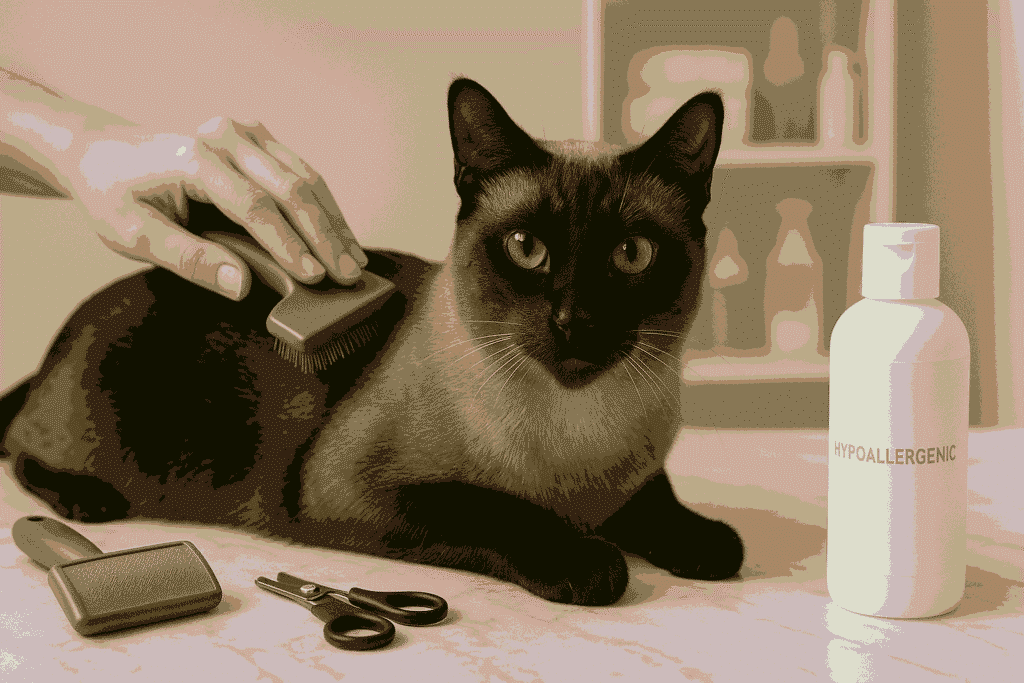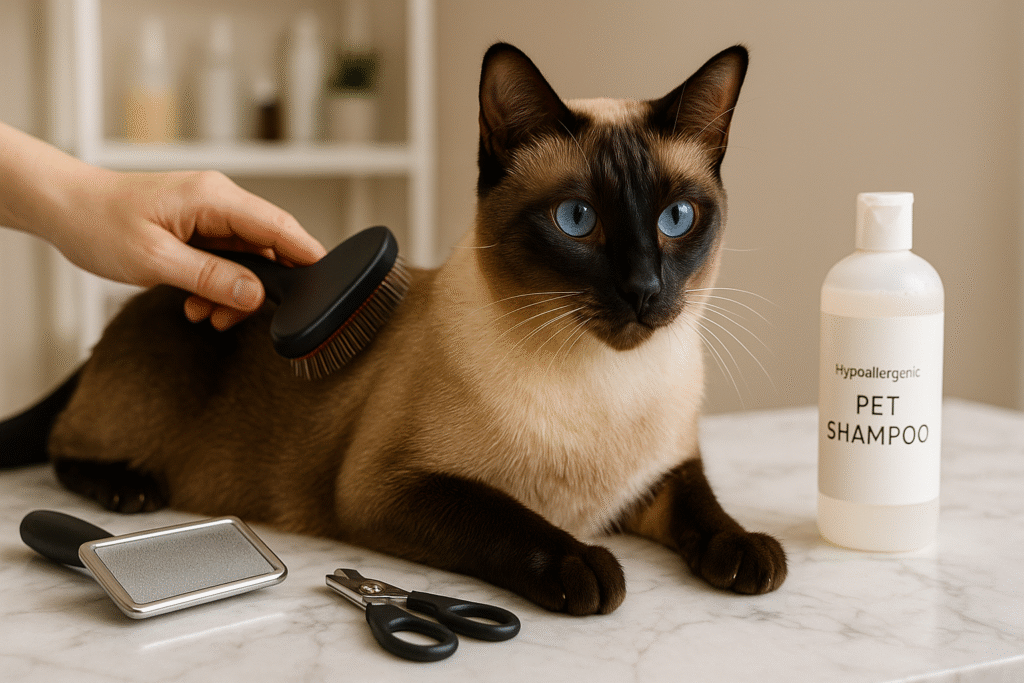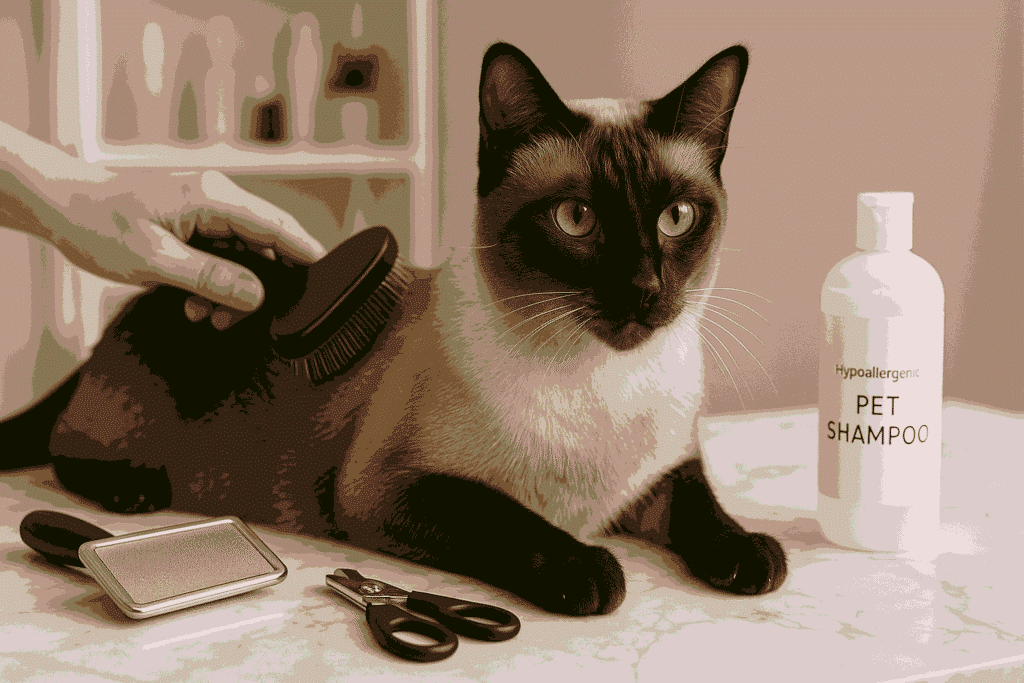Siamese cats are known not just for their beauty, but also for their long lives. On average, a Siamese cat can live between 12 to 20 years. With the right care, some even reach their 20s. But what affects their lifespan, and how can you help them live longer?
Several factors play a rolelike indoor vs. outdoor living, gender, genetic health, and personality. Conditions such as amyloidosis and dental disease can shorten their life. But regular checkups, good food, and a loving home can make a big difference.
In this article, you’ll discover everything you need to know about the lifespan of Siamese cats. From health tips to behavior advice, we cover it all. If you’re a current or future Siamese cat owner, this guide is for you.
- Average Siamese cat lifespan: 12–20 years
- Indoor cats live longer than outdoor cats
- Gender and coat color have minor effects on lifespan
- Common health issues: amyloidosis, dental disease, and neurological problems
- Stress and behavior can affect lifespan
- Diet, supplements and routine vet visits boost longevity
- Signs of aging to look out for
- Care tips for senior Siamese cats
- Tables comparing lifespan factors and health conditions
Siamese Cat Lifespan: How Long Do They Really Live & How to Help Them Thrive
Siamese cats are one of the oldest and most recognized cat breeds, known for their sleek looks and vocal personalities. But how long do Siamese cats live, and what can you do to ensure they live a long and healthy life? This article dives deep into the lifespan of Siamese cats and all the factors that can influence it.
Whether you are considering adopting a Siamese kitten or already have one as a companion, understanding their average lifespan, health risks, and care tips is essential. We’ll also cover gender differences, indoor vs. outdoor survival rates, genetic disorders like amyloidosis and more.
Let’s explore every angle of the Siamese cat lifespan to give you complete clarity and actionable advice that can extend the life of your feline friend.
What Is the Average Lifespan of a Siamese Cat?
Siamese cats generally live between 12 to 20 years, making them one of the longer-living cat breeds. With proper care, it’s not uncommon for them to reach 18 or even 20 years. Their long life expectancy is often credited to strong genetics and attentive owners.
When compared to other breeds, Siamese cats outlive many due to their active lifestyles and strong bonds with humans. However, their lifespan can vary depending on factors like healthcare, diet, and environment.
Veterinary reports confirm that indoor Siamese cats have a higher average lifespan than those allowed to roam outdoors. In this section, we’ll focus on overall longevity statistics and comparisons.
- Average lifespan: 12 to 20 years
- Higher than the average cat breed lifespan
- Indoor cats tend to live longer
- Genetics play a role in longevity
- Proper diet and healthcare can extend lifespan
Summary: Siamese cats are a long-living breed when given the right care, often reaching up to 20 years.
Indoor vs. Outdoor Siamese Cat Lifespan
The environment plays a significant role in a cat’s lifespan. Indoor Siamese cats typically live longer due to reduced exposure to risks like traffic, predators, and diseases.
Outdoor Siamese cats often have shorter lives due to injuries, toxins, and limited veterinary access. While some enjoy outdoor exploration, it usually comes with a trade-off in lifespan.
Indoor cats benefit from stable routines, regular vet visits, and fewer dangers. Therefore, most veterinarians recommend keeping Siamese cats indoors for maximum longevity.
- Indoor cats live 15-20 years
- Outdoor cats average 8-12 years
- Outdoor risks: accidents, predators, infections
- Indoor benefits: safer environment, regular meals
- Outdoor cats require more vet care and protection
Summary: Keeping your Siamese cat indoors significantly increases their lifespan and quality of life.
Lifespan Based on Gender & Color
Some studies suggest that female Siamese cats may live slightly longer than males, though the difference is minimal. Lifespan is more influenced by lifestyle and genetics than gender.
Color variants like blue and white Siamese cats may have unique genetic traits, but no direct evidence links color to lifespan. However, tracking color-specific health trends can still be helpful.
Understanding gender and color in relation to longevity helps owners make more informed care decisions. However, individual health history matters more.
- Female cats may live a bit longer
- Blue/white Siamese have similar lifespans
- Genetics matter more than color
- No proven correlation between color and life expectancy
- Focus on personalized care over breed myths
Summary: Gender and color play minor roles, while health and care routines have a greater impact on lifespan.
Common Health Issues That Affect Lifespan
Siamese cats are prone to several genetic and age-related health issues. The most common include dental disease, respiratory infections, and gastrointestinal problems.
Neurological issues and progressive retinal atrophy can also affect their quality of life. Regular checkups help detect these conditions early and improve outcomes.
Female Siamese cats may be more prone to urinary infections, while males are more at risk for urinary blockages. Understanding these conditions is crucial for timely treatment.
- Common issues: dental disease, respiratory problems, GI issues
- Neurological problems more common in older Siamese
- Retinal degeneration affects eyesight in aging cats
- Female vs. male risk factors differ slightly
- Early diagnosis is key to longevity
Summary: Knowing the common health risks in Siamese cats enables better prevention and treatment for a longer life.
Amyloidosis in Siamese Cats: A Lifespan Threat
Amyloidosis is a serious condition that can affect Siamese cats, often targeting the liver or kidneys. It occurs when abnormal protein deposits damage internal organs.
This condition can drastically shorten a Siamese cat’s lifespan if not diagnosed and treated early. Symptoms include weight loss, vomiting, and frequent urination.
Veterinarians may use ultrasounds, biopsies, and blood tests to diagnose amyloidosis. Treatment includes supportive care, dietary changes, and sometimes medications.
- Amyloidosis is common in Siamese cats
- Affects liver and kidneys
- Symptoms: vomiting, weight loss, lethargy
- Early diagnosis improves outcomes
- Lifespan may be shortened if left untreated
Summary: Amyloidosis is a serious genetic threat in Siamese cats that requires early detection and care.
Siamese Cat Personality and Its Impact on Lifespan
Siamese cats are known for their vocal and demanding nature. When stressed or anxious, their health can decline, especially in a poorly managed environment.
Behavioral issues like aggression or over-attachment can lead to stress-related illnesses. This makes socialization and enrichment essential for their well-being.
Both male and female Siamese cats can develop behavioral quirks, but with positive reinforcement and companionship, they thrive.
Key Points:
- Siamese cats need mental stimulation
- Stress can affect their health negatively
- Behavioral issues should be managed early
- Male cats can be more territorial
- Social cats live healthier, longer lives
Summary: A well-stimulated, stress-free Siamese cat is far more likely to enjoy a longer, healthier life.
How to Help Your Siamese Cat Live Longer
A healthy diet, regular exercise, and annual vet visits are essential. Siamese cats also need plenty of interaction and mental stimulation to stay healthy.
Nutritional supplements can be considered for older cats. Look for omega-3s, taurine, and antioxidant-rich foods to support their organs and immune systems.
Keep your home safe and enriching with scratching posts, puzzle toys, and cozy resting areas to reduce stress and increase happiness.
- Regular vet visits and vaccinations
- Balanced, breed-appropriate diet
- Plenty of play and bonding time
- Safe, clean living environment
- Use of supplements for aging support
Summary: Proactive care can significantly increase the lifespan and life quality of your Siamese cat.
Signs of Aging in Siamese Cats
Siamese cats age gracefully, but signs like decreased activity, weight loss, or vision problems can appear after age 12. Monitoring changes is vital.
Behavioral shifts such as reduced grooming or avoiding social interaction may signal health issues. Dental problems and joint stiffness are also common.
Early intervention and supportive care can make their senior years comfortable and joyful.
- Signs: lethargy, weight change, eye cloudiness
- Loss of interest in grooming or play
- Joint issues in older cats
- Senior checkups recommended every 6 months
- Aging cats benefit from dietary adjustments
Summary: Recognizing the signs of aging helps you adjust care and extend your Siamese cat’s golden years.
Average Lifespan by Environment and Gender
| Category | Average Lifespan (Years) |
|---|---|
| Indoor Siamese Cat | 15-20 |
| Outdoor Siamese Cat | 8-12 |
| Male Siamese Cat | 12-18 |
| Female Siamese Cat | 13-20 |
| With Amyloidosis Diagnosis | 3-5 (if untreated) |
| Health Condition | Symptoms | Affects Lifespan? |
| Dental Disease | Bad breath, drooling | Yes |
| Amyloidosis | Vomiting, weight loss, lethargy | Yes |
| Retinal Atrophy | Vision loss | No (quality only) |
| Neurological Disorders | Seizures, imbalance | Yes |
| Urinary Tract Infections | Frequent urination, blood in urine | Sometimes |
Conclusion
The Siamese cat is a long-living, lovable breed with a lot of personality and energy. By understanding the factors that affect their lifespan—from gender, health, and behavior to environment and care—you can significantly improve their longevity.
With proactive care, regular vet visits, a balanced diet, and lots of affection, your Siamese cat can live well into its late teens or beyond. Remember, a happy cat is often a healthy cat.
Start today with simple changes and ensure your furry friend lives the long, fulfilling life they deserve.



